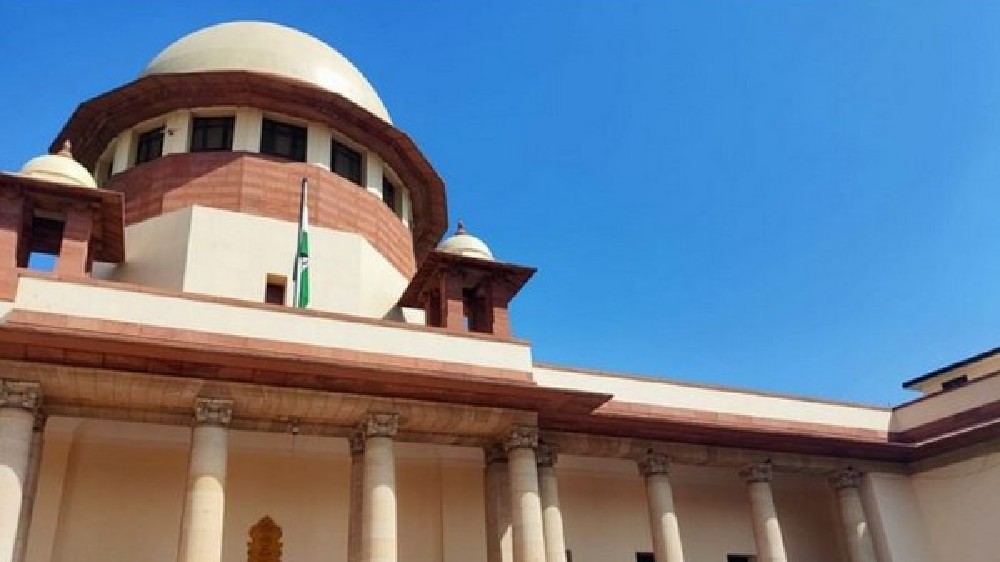Issue of freebies complex, need to draw distinction: SC
"The issue requires debate and may be put for consideration before the parliament," the bench said.

NEW DELHI: The Supreme Court on Tuesday said that the issue concerning freebies is complex and there is a need to draw a distinction between welfare schemes and other promises that are made by political parties before elections.
A bench headed by Chief Justice of India NV Ramana said the issue concerning freebies is an important one and requires debate.
The bench said that the Supreme Court is hearing the issue for the welfare of the country and posted the case for further hearing on August 24.
The top court was hearing a batch of pleas seeking direction to seize election symbols and deregister political parties that promised to distribute irrational freebies from public funds.
During the hearing, the apex court observed that all political parties want freebies and engage in such pre-poll promises.
CJI Ramana said that some items given as freebies such as bicycles for women or cattle for farmers can also fall within the definition of a welfare move.
"The issue requires debate and may be put for consideration before the parliament," the bench said.
"Cows and goats in a rural area give livelihood and this cannot be seen in such a water compartment way. Some are given bicycles as the women are able to get an education or pursue business. The question is what is a freebie and what is welfare," CJI said.
The bench further observed, "A rural poverty struck person, for them such kits are important and it cannot be debated here in this room."
On setting up of a commission, the bench said, "This is a democracy and the parliament has to debate and for that, some background paper must be there and thus a commission will help."
The apex court had earlier said that there is a need of a commission consisting of Niti Aayog, Finance Commission, ruling and opposition parties, Reserve Bank of India, and other stakeholders to make suggestions on how to control freebies by political parties.
Senior advocate Kapil Sibal, assisting the apex court on the issue, said that a "non-political body" like Finance Commission may look into the issue and make recommendations.
He said that issue of freebies must be viewed through a fiscal lens rather than a political one which can be facilitated if finance divisions of governments are entrusted with considering the delivery of promises made.
Solicitor General of India Tushar Mehta, appearing for the Centre, argued against the freebies and said, "These can have a devastating economic effect on the finances of the states."
On the last date of the hearing, the apex court had said that it cannot prevent political parties from making promises during the election campaigns but the question is what constitutes right promises and what is the right way of spending public money.
Political parties like Aam Aadmi Party (AAP), Congress and Dravida Munnetra Kazhagam (DMK) have sought to intervene in the matter and opposed the plea.
AAP had filed an application stating that electoral promises such as free water, free electricity and free transport are not 'freebies' but these schemes are absolutely essential in an unequal society.
Earlier, the Supreme Court had said that promising and distributing freebies by political parties during elections is a "serious issue" and an amount has to be spent for infrastructure etc. It had said that economy losing money and the welfare of people, both have to be balanced.
The Election Commission had pointed out that it was the Supreme Court in its 2013 judgment which had held that promises made by political parties and candidates in their manifestos could neither be construed as a corrupt practice under the Representation of the People Act nor the violation of level playing field (Article 14).
One of the pleas filed by advocate Ashwini Upadhyay claimed that political parties' arbitrarily promises or irrational freebies for wrongful gain and to lure voters in their favour is analogous to bribery and undue influences.
It claimed that promise or distribution of irrational freebies from public funds before elections could unduly influence the voters, shake the roots of a free and fair election, and disturb the level playing field, besides vitiating the purity of the election process.
Visit news.dtnext.in to explore our interactive epaper!
Download the DT Next app for more exciting features!
Click here for iOS
Click here for Android



